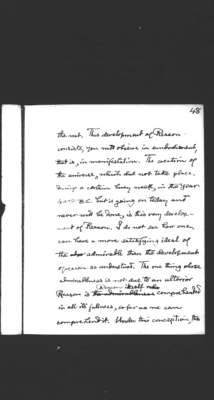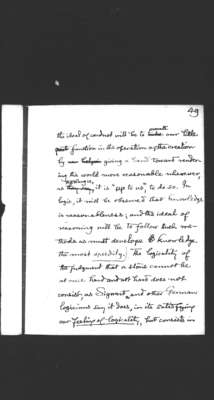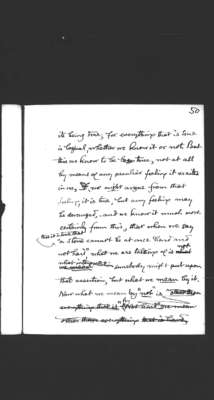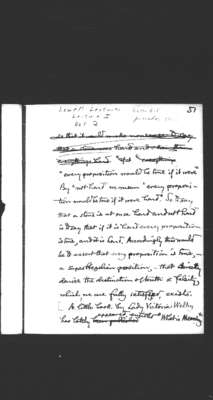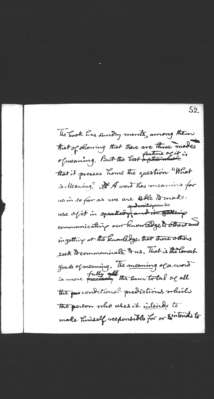Pages
76
48
the rest. This development of Reason consists, you will observe in embodiment, that is, in manifestation. The creation of the universe, which did not take place during a certain busy week, in the year 4004 B.C. but is going on today and never will be done, is this very development of Reason. I do not see how one can have a more satisfying ideal of the admirable than the development of reason so understood. The one thing whose admirableness is not due to an ulterior Reason is Reason itself comprehended in all its fullness, so far as we can comprehend it. Under this conception, the
77
49
the ideal of conduct will be to execute our little function in the operation of the creation by giving a hand towards rendering the world more reasonable wherever, as the slang is, it is "up to us", to do so. In logic, it will be observed that knowledge is reasonableness; and the ideal of reasoning will be to follow such methods as must develop knowledge the most speedily. The logicality of the judgement that a stone cannot be at once hard and not hard does not consist, as Sigwart and other German logicians say it does, in its satisfying our feeling of logicality, but consists in
78
50
its being true; for everything that is true is logical, whether we know it or not. But this we know to be true, not at all by means of any peculiar feeling it excites in us, we might argue from that feeling, it is true, but any feeling may be deranged, and we know it much more certainly from this, that when we say it is true that "a stone cannot be at once hard and not hard", what we are talking of is not what interpretation somebody might put upon that assertion, but what we mean by it. Now what we mean by "not" is
79
51
Lowell Lectures Lecture I Vol 2
"every proposition would be true if it were" By "not hard" we mean "every proposition would be true if it were hard." So to say that a stone is at once hard and not hard" is to say that if it is hard every proposition is true, and it is hard. Accordingly this would be to assert that every proposition is true, - a super Hegelian position, - that direstly denies the distinction of truth + falsity, which we are fully satisfied, exists. A little book by Lady Victoria Welby has lately appeared entitled "What is Meaning"
80
52
The book has sundry merits, among them that of showing that there are three modes of meaning. But the best feature of it is that it presses home the question "What is Meaning." A word has meaning for us in so far as we are able to make use of it in communicating our knowledge to others and in getting at the knowledge that those others seek to communicate to us. That is the lowest grade of meaning. The meaning of a word is more fully the sum total of all the conditional predictions which the person who uses it intends to make himself responsible for or intends to
